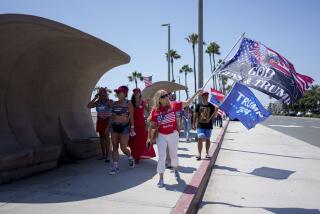Journey to a Strange Homeland
- Share via
My father’s memories were vague.
He’d last been there as a boy of 4 or 5, before World War I, before the armies of Austria-Hungary and Italy hammered the little town to rubble during a protracted series of artillery battles.
“The town is called Kanale, or Kanal,” my father, an immigrant to the United States, told me 30 years ago, a decade before he died.
“Your grandfather was born there,” my father said. “There was a big stone house above the Isonzo River. I think they raised some pigs.”
As a native Californian who had never found anyone (other than a few close relatives in the New World) with the same last name as mine, I often had pondered the prospect of unearthing some other Malnics on their native European soil.
Then, this year, I found myself in southern Austria, about a hundred miles from a spot marked Kanal on the map. It seemed like the right place to start looking.
A lot of things have changed since 1914.
*
Before World War I, the town had been part of Austria-Hungary. Then the town, restored and rebuilt piecemeal over the years, had become part of the new nation of Yugoslavia. After World War II, Yugoslavia became part of Communist Eastern Europe. The collapse of Communism in the 1990s tore Yugoslavia to shreds, giving birth to the new nation of Slovenia.
And that’s where I headed one sunny morning, accompanied by two Austrian cousins--Wolfgang Kaltenegger and Bridgette Putschek, who share that same grandfather--and our spouses. All of us are, or are soon to be, in our 60s.
All we had to go on were my father’s uncertain recollections and two tiny, faded photographs of a picturesque town, taken sometime around 1900.
I drove south through the rugged, spectacular Julian Alps until we reached a pass that marks the border between Austria and Slovenia.
Two Slovenian customs officials glanced up from their magazines just long enough to wave us through. We had to back up and ask before they even bothered to stamp our passports.
So much for breaching the old Iron Curtain.
Driving south for another hour, we were following the twisting, forested course of the Isonzo when suddenly we came upon a road sign: Kanal. There, to the left, was a stone bridge over the rushing river, just like the one in the photographs. The 18th century buildings looked right, too.
Crossing the bridge, we stopped by the old church, figuring that the town priest might have some records we could work from. He wasn’t there.
We quickly learned that Slovenian--a Slavic language that none of us knew a word of--isn’t a lot like English, German, French, Italian or Spanish, which various members of our group could manage to varying degrees.
Unfortunately, the town barber, the man getting a haircut, the people at the cafe, the folks at the market and the guys hanging around the main square didn’t know much English, German, French, Italian or Spanish. But they smiled a lot, shook hands all around and offered what sounded like encouragement.
Then my wife, Martha, stopped by the bank, where she found a teller who spoke some English.
“There’s a house around the corner,” the teller said. “I think it used to belong to someone named Malnic.”
A woman at the house, who spoke a little Italian, said the Malnics were long gone. But she invited us all in for a drink, and after a few minutes, she recalled that someone named Malnic might still live “to the right of the church.”
That left a lot of latitude, even in a town of only 2,500 or so, so we fanned out. Cousin Bridgette found another woman who used to know someone named Malnic, and we were invited in for another drink. Martha, in search of picnic supplies, swung by a little grocery shop. Inside, she heard a lot of unintelligible remarks in Slovenian, punctuated repeatedly by arm gestures and the name “Malnic.”
Word was getting around.
*
A few minutes later, someone led Wolfgang to a small apartment house. One of the names on the mailboxes was “Malnic.” Upstairs, Wolfgang found Leo Malnic, a lean, tanned, laid-back fellow in his mid-40s who looks a little like my father.
Our precise relationship isn’t quite clear but Leo and I are certain that we’re kinfolk. We could tell when he led us to the local graveyard, and pointed out the graves of his relatives, and Wolfgang and Bridgette looked at the headstones and recognized the names as our relatives’, too.
Afterward, Leo took us a mile or so down the road to the rustic home of one of his--and our--distant cousins, Evelena Malnic. She had been sweeping her porch and was unprepared to meet a gaggle of enthusiastic foreigners but recovered admirably, inviting us all into her kitchen. Everyone had some canned orange juice except Leo, who settled instead for a shot of slivovitz, the local firewater.
For the next half hour or so, we all sat around Evelena’s kitchen, chattering happily in Slovenian, English, German, French, Italian and Spanish.
No one understood very much, but it didn’t matter. We were glad to be there with each other, having a good time.
Evelena did manage to get it across that the big house on the hill--the one my father remembered--had been destroyed in the World War I shelling and was never rebuilt.
I never did find out about the pigs.
More to Read
Sign up for Essential California
The most important California stories and recommendations in your inbox every morning.
You may occasionally receive promotional content from the Los Angeles Times.










